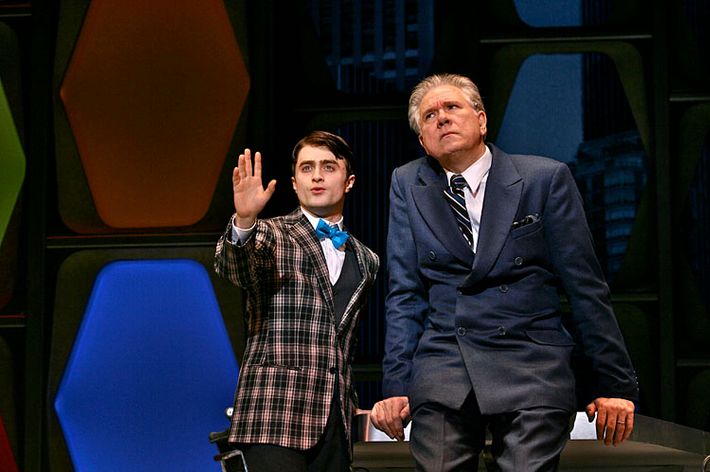

Daniel Radcliffe has described his take on J. Pierrepont Finch, the cheerily cutthroat corporate climber of Frank Loesser and Abe BurrowsÔÇÖs 1961 musical satire How to Succeed in Business Without Really Trying, as ÔÇ£kind of a period Mark ZuckerbergÔÇØ ÔÇö and for the first few moments of Rob AshfordÔÇÖs zippy new revival, I was worried that heÔÇÖd succeeded. Radcliffe, when heÔÇÖs literally dropped into the middle of the opening number, comes off as no more a natural song-and-dance man than FacebookÔÇÖs founder-cipher would. I initially mistook his stiffened mug and turtle-ish posture for the telltale body language of Broadway roadkill: Here lies another larger-than-life screen idol forcibly downsized by the sheer amplitude of live musical theater (the piercing screams of his teenage fans notwithstanding).
Luckily for everyone, thatÔÇÖs not how the deal goes down. What Radcliffe and Ashford pull off in this surprisingly succulent production is a fairly exhilarating demonstration of how a well-run musical, like a well-run company, adapts itself to the peculiar talents of its personnel, and not the other way around. With AshfordÔÇÖs flair, RadcliffeÔÇÖs dogged discipline and great good humor, and a deep bench of performing talent, How to Succeed ÔÇö written as a poke at at the gray-flannel innards of a mid-century business behemoth ÔÇö moves with the fleet feet and bright-eyed buoyancy of a start-up. Its satiric DNA may be rooted in the Sterling Cooper era, but the energy here is present-tense, urgent and undeniable.
Radcliffe has often struck the ungenerous mind ÔÇö mine, I mean ÔÇö as a nice, lucky kid who was in the right place at the right time. He was the boy who looked like Harry Potter, therefore Hollywood made him Harry Potter. Naturally, every actor wants and needs to be thought of as more than an avatar for a trademark, but Radcliffe, Equus aside, has always given off a just-happy-to-be-here vibe. He still does, and it might be his greatest asset here. For Finch is also a bit of a blank page, one that no one can resist filling with his or her obsessions. ÔÇ£He has a sort of noble courage,ÔÇØ projects Rosemary (newcomer Rose Hemingway, bright and sweet, her voice bejeweled), the steno-pool ingenue who falls for him just-cuz ÔÇö and whose head-spinningly pre-feminist motives are best left unexamined. ÔÇ£Yet deep down,ÔÇØ she goes on, ÔÇ£I feel that heÔÇÖs sort of helpless.ÔÇØ Helpless Finch is most certainly not ÔÇö he dispatches rival after rival with comically ruthless efficiency on his way to the top. But he has no real dreams and no real talents (apart from self-promotion), only the titular self-help book and a trajectory: up. RadcliffeÔÇÖs approach to Finch samples neither Robert MorseÔÇÖs love-me buffoon nor Matthew BroderickÔÇÖs Kermitish ironist. HeÔÇÖs an adapter ÔÇö he doesnÔÇÖt generate his own juice, but you can run a heck of a lot of current through him. Instead of trying to light the show on fire, Radcliffe digs in, sticks every dismount with an ingenious charm I can only describe as 1,000-watt bashfulness, and has the patience to let the intensity kind of accrue around him.
And believe me, the intensity does accrue. Rob Ashford directs this show like thereÔÇÖs something chasing him. (Possibly the tepid reviews of the similarly milieu-ed Promises, Promises?) YouÔÇÖd need to be fly-eyed to catch all the pinwheeling nuances of his multidimensional stage pictures and kaleidoscopic dance formations, some of which practically qualify as plays-within-plays. He builds dazzling towers of motion atop LoesserÔÇÖs punchy, playful score: Even nod-and-smile one-joke chestnuts like ÔÇ£Coffee BreakÔÇØ (which Ashford transforms into a twitching zombie number) and ÔÇ£Been a Long DayÔÇØ (where an increasingly crowded elevator becomes a visually witty scene-building device) get huge new boosts of vitality. (And I wonÔÇÖt begin to spoil AshfordÔÇÖs stops-out ÔÇ£Brotherhood of Man,ÔÇØ except to reveal that heÔÇÖs drilled Radcliffe into quite the full-body hoofer: When you see FinchÔÇÖs stiffness and diffidence liquesce into pure rhythm, you suddenly realize why AshfordÔÇÖs been saving him up all night.)
The ensemble seems to have gotten AshfordÔÇÖs memo: No oneÔÇÖs giving less than 200 percent. A perfectly cast John Larroquette plays company president J. B. Biggley, the saturnine tyrant Finch must constantly seduce (often at RosemaryÔÇÖs expense) with all-too-convincing bloat and exasperation: His passionate college fight song, ÔÇ£Grand Old Ivy,ÔÇØ which Finch teases out of him by posing as a fellow alum, brings juice to the oldest old-boysÔÇÖ-network clich├® in the universe. FinchÔÇÖs nemesis, the wicked Bud Frump, is given a fresh reboot by Christopher J. Hanke (who trades the queeny shadings of yesteryear for a portrayal out of The Hipster Handbook). And the skilled comedienne Tammy Blanchard, playing fabulously off-balance office tart Hedy LaRue, curates a wiggly walking tour of the classic bimbos of yesteryear.
How to Succeed, as corporate satire, is no more or less up-to-date than it was at the time of its last revival in 1995. Today, we watch it through the lens of Mad Men, which gives us license to enjoy such (officially) retired office rituals as sexual harassment and carnal noblesse oblige at a safe distance. Its punch lines about the moral and intellectual emptiness and bureaucratic ellipses of the business world are now so internalized theyÔÇÖre practically reflexes, but Abe BurrowsÔÇÖs zingers still zing. And Radcliffe, with a wink, is the perfect company man, a Lucite bridge between the private sectorÔÇÖs ill-behaved past and its poker-faced present. HeÔÇÖs at the right place at the right time. If youÔÇÖre looking for an entirely satisfying night of oldfangled entertainment, you might consider being there, too.

